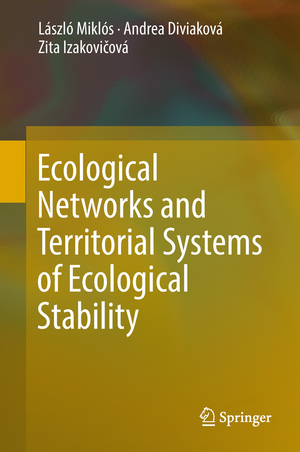Ecological Networks and Territorial Systems of Ecological Stability
Autor László Miklós, Andrea Diviaková, Zita Izakovičováen Limba Engleză Hardback – 23 aug 2018
| Toate formatele și edițiile | Preț | Express |
|---|---|---|
| Paperback (1) | 614.34 lei 38-44 zile | |
| Springer International Publishing – 31 ian 2019 | 614.34 lei 38-44 zile | |
| Hardback (1) | 542.62 lei 38-44 zile | |
| Springer International Publishing – 23 aug 2018 | 542.62 lei 38-44 zile |
Preț: 542.62 lei
Preț vechi: 669.90 lei
-19% Nou
Puncte Express: 814
Preț estimativ în valută:
103.83€ • 108.68$ • 86.42£
103.83€ • 108.68$ • 86.42£
Carte tipărită la comandă
Livrare economică 26 martie-01 aprilie
Preluare comenzi: 021 569.72.76
Specificații
ISBN-13: 9783319940175
ISBN-10: 3319940171
Pagini: 93
Ilustrații: XV, 152 p. 25 illus., 23 illus. in color.
Dimensiuni: 155 x 235 mm
Ediția:1st ed. 2019
Editura: Springer International Publishing
Colecția Springer
Locul publicării:Cham, Switzerland
ISBN-10: 3319940171
Pagini: 93
Ilustrații: XV, 152 p. 25 illus., 23 illus. in color.
Dimensiuni: 155 x 235 mm
Ediția:1st ed. 2019
Editura: Springer International Publishing
Colecția Springer
Locul publicării:Cham, Switzerland
Cuprins
1. Introduction.- 2. Starting points for creating ecological networks.- 3. Methodological base for development of the territorial system of ecological stability.- 4. Method and procedures of designing the territorial system of ecological stability.- 5. Conclusion.- 6. Summary.- 7. References.- 8. Case study: Evaluation of linear formations of non-forest woody vegetation (biocorridors) for the territorial systems of ecological stability (model territory: the village of Žibritov).
Textul de pe ultima copertă
This book provides a wealth of information for all those involved in using ecological networks for biodiversity protection and environmental management, as well as their significance for planning. It describes the concept of ecological networks, and presents methods and real-world examples of the use of a territorial system of ecological stability (TSES) in Slovakia at national, regional and local levels, including the assessment of the significance of biocentres, biocorridors and interactive elements. Using both a functional model for preserving the living conditions of habitats or preventing their collapse, and the connectivity of biotopes in a landscape as an original type of ecological network based on landscape-ecological principles, TSES represents a modern concept of nature and biodiversity protection based on the principles of protection of the conditions and forms of biota.
Caracteristici
Discusses the theory of ecological networks, an applied method of econet design, up to its implementation for legislative, planning and projecting purposes at national, regional, and local level Proposes interactive elements and ecostabilising measures, including legal actions, to ensure a proper level of conservation of strictly protected areas (nature reservations as biocentres and biocorridors), as well as proper ecological quality of the structure of the entire landscape Shows that the TSES method represents a real, legally enforceable, regular and routine transfer of landscape ecological principles to spatial planning processes Demonstrates that the TSES method is also applicable in other countries
